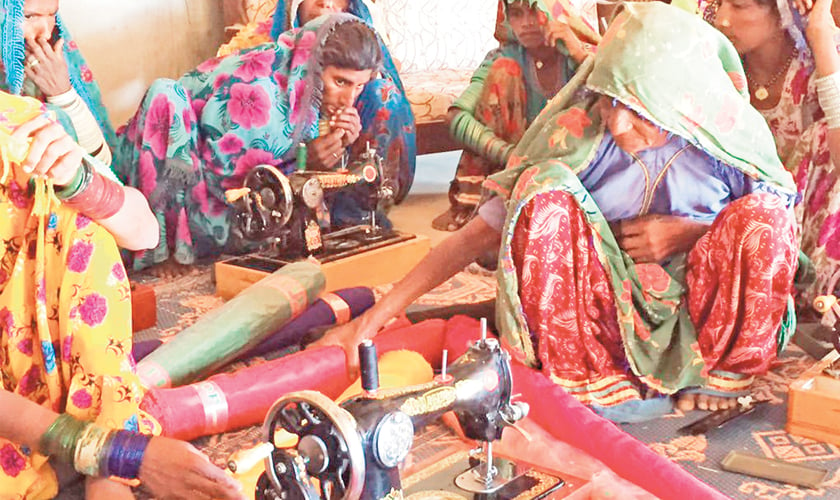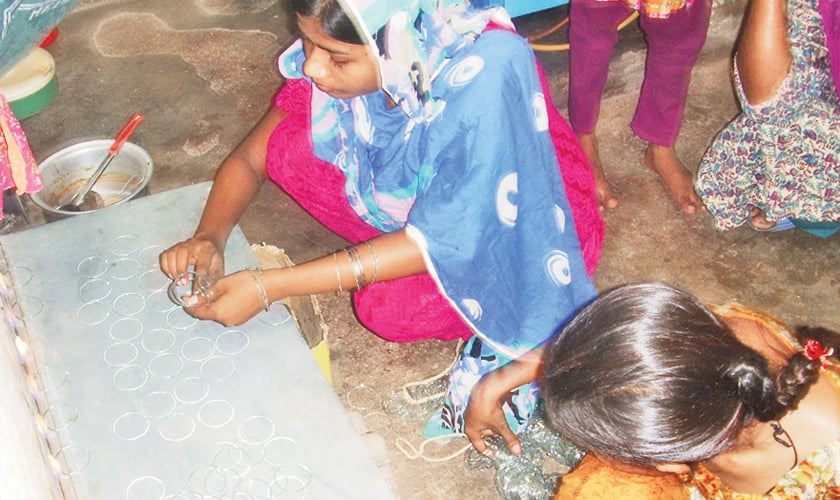Recently, Sindh government has approved a policy for home-based workers. Once implemented, they will be able to avail facilities such as social security, pension and other benefits. You! takes a look...
Recently, Sindh government has approved a policy for home-based workers. Once implemented, they will be able to avail facilities such as social security, pension and other benefits. You! takes a look...
Tharparkar District is one of the twenty-nine districts of Sindh province in Pakistan. Mithi is the capital of Tharparkar District which is surrounded by small towns and villages. Located nine kilometres south of Mithi, Tharparkar is village Dheeta Bheel.

Meena Kumari, 33, is a home-based worker and a resident of village Dheeta Bheel. Meena, mother of five, is famous for her craft of making rallis (traditional patch work). Her husband, a farmer, doesn't earn enough to fulfill the basic needs of the family, so she works for long hours and make rallis to supplement the family's income. She makes excellent designs on rallies and it takes her several days to complete one piece. The designs are original and this skill has been passed on to her by her mother. As she works from home, she uses her own space and electricity that add to the costs she bears. Sadly, the wages she earns (Rs 300 to Rs 500 per piece) are far less than what she deserves and a fraction of what the middlemen and the contractors make from the sale of these products. What happens is that the unfinished products bought from women like Meena are sold in the local markets of Karachi for thousands of rupees after finishing. There are very few organizations dealing in this trade that pay reasonable prices to workers; otherwise the situation is dismal.
Meena is just one of the millions of home-based workers in the country who are facing exploitation at the hands of middlemen and are ridiculously underpaid for their work. Home-based workers, mostly women, are not considered as labours and are not covered under the country's existing labour laws. There is no job security for them as they are engaged by middlemen and social security cover is something they are not familiar with. They are exposed to extreme occupational hazards and are often found suffering from diseases caused due to the conditions in which they work in. These workers are found in different trades including embroidery work, incense stick making, packing of food items, peeling of prawns, peeling skin of shelled dry fruits and so on. Mostly, the whole family works to maximize its earning. Due to this, children's education and health also suffers.
This situation has always called for corrective action, measures by the government to improve the situation and legislation to provide a legal framework under which these workers can be granted their rights. Though different provinces have been mulling over this, the good news is that Sindh province has taken the lead and set an example by approving a policy for home-based workers. Once implemented, the home-based workers in Sindh would be able to avail facilities such as social security, pension and coverage under Employees Oldage Benefits Institution (EOBI) scheme and will be granted the right to associate, form unions for collective bargaining and seek redressal from labour courts if they feel they are wronged by the employers. In short, they will be covered to a great extent under the existing labour laws and will be officially counted among the labour force of the province. Under social security cover, the beneficiaries can get medical treatment for family, education for children, marriage grants for daughters, death grant, disability grant etc.
Even though the announcement of this policy is a great move on the part of government, one can't deny the fact that there will be some issues with the implementation of this policy and the most pressing one will be the availability of funds to bear all the associated costs. Whether, the government will bear the burden; or the employers would deposit contribution for the social security and EOBI coverage; or the home-based workers will spare a small portion of their income for this purpose, are some questions that need to be addressed. Normally, to avail social security cover, EOBI etc, financial contribution has to be made by the employer and the government.

According to Gulfam Nabi Memon, Joint Director, Sindh Labour Department, “The draft of the policy approved by the provincial cabinet under the Sindh Chief Minister (CM) has been approved and sent to the law department for vetting. Once this is done, it will be presented in the provincial assembly and it is hoped that it will easily sail through. The rules and regulations will be drafted soon after,” he adds.
Gulfam Nabi Memon agrees that the provision of funds is an issue and the government may find difficulty in arranging these. “Due to this, it has been recommended that the employers and workers can be asked to make financial contributions to social security fund and EOBI. The problem with home-based workers is that it is difficult to identify their employers as they work through middlemen and there is no direct link between the employer and the worker. The policy will take care of this as well,” points out Memon.
Regardless of the complexities involved, the labour rights activists, trade unions, civil society etc are celebrating the approval of this policy by Sindh. They say it is the first step and there are many more to follow.
Ume Laila Azhar, Executive Director, Homenet Pakistan, lauds what she calls a landmark achievement of Sindh government. “This policy reaffirms Sindh government's commitment to bring the laws and regulations concerning home-based workers in Sindh in conformity with the Constitutional provisions, common standards and principles developed by international human rights treaties such as Convention on Elimination of All Forms of Discrimination Against Women (CEDAW), Convention on the Rights of the Child (CRC) , International Covenant on Economic Social and Cultural Rights (ICESCR) , ILO Conventions and the Constitutional right to education (Article 25-A). The Constitutional right to be protected from slavery and forced labour (Article 11) and the right of association and collective bargaining (Article 17) are also covered under this policy,” explains Azhar.
Homenet Pakistan has taken several initiatives such as linking women like Meena (the ralli maker) with the market directly. A memorandum of understanding (MOU) with the Women Development Department, Sindh, and Homenet Pakistan was signed in February 2014 and under it both the signatories launched a display and sale centre for the products made by home-based workers based in Sindh.
“It is a moment of extreme happiness and contentment for the Homenet Pakistan and other organisations working for the rights of home-based workers. Earlier, we were making efforts on our own but now the Sindh government is bringing these under the ambit of law,” she adds.
The policy has brought hope to many home-based workers and Mai Sakina, 46, is one of them. She lives with her family comprising six members in a backward area on the outskirts of Sukkur city and is involved in bangle-making. Her husband is a labourer who works throughout the day and hardly earns enough money to buy food and meet the family's basic needs. He is often short of money and in debt. So, Mai is supporting her husband and earning a living through bangle-making. This also helps them bear the expenses of their children's education.
Mai says making glass bangles is a tough and risky job as the workers have to handle chemicals, broken glass, dyes etc. and during the process sit close to fire. Despite all this, the income is too scant. “I used to earn Rs 4500 per month in the past but with the fixing of minimum wage for bangle workers, my income has gone up to Rs 13,000 per month,” she tells. Though Sindh government has announced a minimum wage for women bangle-makers very few like Mai have benefitted. Otherwise, the same system of exploitation exists where middlemen flourish and workers suffer.
Fasih ul Karim Siddiqi, Secretary General, Employers Federation of Pakistan (EFP) suggests that the government should foot the bill and pay contributions under social security and EOBI for home-based workers at least for five years. It is unlikely that employers of home-based workers will be willing to pay six per cent of a worker’s salary as social security contribution, two per cent for EOBI and one per cent as education cess. “The status of home-based workers can be increased by enhancing their skills and increasing their employability in the market. When they will become highly skilled, the employers will search for them and the middlemen will become a thing of the past,” he concludes.